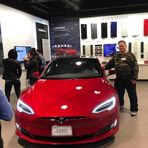Tesla's Turbulent Road: Navigating Challenges and AI Aspirations
April 23, 2025, 10:13 pm

Location: United States, Texas, Austin
Employees: 10001+
Founded date: 2003
Total raised: $3.86B
Tesla is at a crossroads. The electric vehicle giant recently reported a staggering 71% drop in net income, a figure that sent shockwaves through the market. Revenue fell by 9%, landing at $19.3 billion. Vehicle deliveries plummeted by 13%, marking the weakest performance since 2022. Yet, amidst this storm, Tesla is pivoting its narrative. The focus is shifting from missed targets to ambitious plans in artificial intelligence and energy.
The numbers tell a sobering story. Operating income dropped 66%, and the operating margin shrank to a mere 2.1%. These figures are alarming for any company, especially one that once basked in the glow of rapid growth. The decline in vehicle deliveries—336,681 units—reflects a broader trend of slowing demand and rising competition. Tesla's strategy to transition to the refreshed Model Y has not cushioned the blow. Instead, it has exposed vulnerabilities in a market that is evolving faster than anticipated.
Despite these setbacks, the market reaction was surprisingly muted. Tesla shares rose over 4% in after-hours trading. Investors seem more interested in the future than the present. This is a testament to the company's ability to weave a compelling narrative around its AI ambitions. Tesla is no longer just a car manufacturer; it is positioning itself as a leader in robotics and autonomy.
Elon Musk, the company's enigmatic CEO, is doubling down on this vision. He announced plans for a robotaxi service in Austin, Texas, set to launch by June. Musk's bold forecast includes millions of autonomous vehicles offering paid rides by 2026. This is not just a pipe dream; it’s a calculated bet on the future of transportation. The recent launch of Tesla's full self-driving software in China marks a significant step into a tightly regulated market, showcasing the company's commitment to innovation.
However, the road ahead is fraught with challenges. Tesla's energy division did show promise, with a 67% year-over-year growth, reaching $2.73 billion in revenue. Battery storage deployments hit record highs, driven by the Powerwall and Megafactory facilities. Yet, the company faces rising costs due to global trade headwinds. Tariffs on Chinese parts could add up to $2,000 to the cost of a vehicle. This is a significant hurdle for a company that prides itself on affordability and accessibility.
Political tensions are also casting a shadow over Tesla's brand. Musk's controversial political activities have alienated some core customers. Reports of vandalism and canceled deliveries are rising, particularly in North America. In Europe, sales have plummeted nearly 45% year-over-year. The Tesla brand, once synonymous with innovation and sustainability, is now entangled with Musk's political persona. This shift is not just damaging; it’s potentially catastrophic for a company that relies heavily on consumer goodwill.
The backlash against Musk's political involvement is palpable. Analysts point to his alignment with the Trump administration as a key factor in deteriorating brand sentiment. The once-celebrated image of Tesla as a pioneering clean-energy brand is now muddied by Musk's high-profile political engagements. The disconnect between Musk's persona and the values of Tesla's early adopters is widening. For many, the Tesla badge now carries political weight—weight that does not help sell cars.
Despite these challenges, Musk remains optimistic. He has announced plans to reduce his political engagements, hoping to refocus on Tesla's core operations. This decision has been welcomed by investors, who see it as a step toward regaining trust. The company ended the quarter with $37 billion in cash, a cushion that provides some breathing room. New, more affordable vehicle models are expected to begin production in 2025, which could help restore some of the lost consumer confidence.
Tesla's future hinges on its ability to navigate these turbulent waters. The ambitious AI initiatives are promising, but they must be grounded in reality. The company needs to regain focus on its core operations while repairing its damaged brand. Analysts caution that a full recovery will depend on Musk's ability to balance innovation with consumer sentiment.
The road ahead is uncertain. Tesla's journey is a testament to the volatile nature of the tech and automotive industries. As the company shifts its narrative, it must also confront the realities of a changing market landscape. The promise of AI and autonomy is enticing, but it must be matched with a commitment to quality, affordability, and brand integrity.
In conclusion, Tesla stands at a pivotal moment. The challenges are significant, but so are the opportunities. The company's ability to adapt and innovate will determine its fate in the coming years. As it navigates this complex terrain, one thing is clear: the future of Tesla is not just about electric vehicles; it’s about redefining transportation itself. The journey is far from over, and the destination remains to be seen.
The numbers tell a sobering story. Operating income dropped 66%, and the operating margin shrank to a mere 2.1%. These figures are alarming for any company, especially one that once basked in the glow of rapid growth. The decline in vehicle deliveries—336,681 units—reflects a broader trend of slowing demand and rising competition. Tesla's strategy to transition to the refreshed Model Y has not cushioned the blow. Instead, it has exposed vulnerabilities in a market that is evolving faster than anticipated.
Despite these setbacks, the market reaction was surprisingly muted. Tesla shares rose over 4% in after-hours trading. Investors seem more interested in the future than the present. This is a testament to the company's ability to weave a compelling narrative around its AI ambitions. Tesla is no longer just a car manufacturer; it is positioning itself as a leader in robotics and autonomy.
Elon Musk, the company's enigmatic CEO, is doubling down on this vision. He announced plans for a robotaxi service in Austin, Texas, set to launch by June. Musk's bold forecast includes millions of autonomous vehicles offering paid rides by 2026. This is not just a pipe dream; it’s a calculated bet on the future of transportation. The recent launch of Tesla's full self-driving software in China marks a significant step into a tightly regulated market, showcasing the company's commitment to innovation.
However, the road ahead is fraught with challenges. Tesla's energy division did show promise, with a 67% year-over-year growth, reaching $2.73 billion in revenue. Battery storage deployments hit record highs, driven by the Powerwall and Megafactory facilities. Yet, the company faces rising costs due to global trade headwinds. Tariffs on Chinese parts could add up to $2,000 to the cost of a vehicle. This is a significant hurdle for a company that prides itself on affordability and accessibility.
Political tensions are also casting a shadow over Tesla's brand. Musk's controversial political activities have alienated some core customers. Reports of vandalism and canceled deliveries are rising, particularly in North America. In Europe, sales have plummeted nearly 45% year-over-year. The Tesla brand, once synonymous with innovation and sustainability, is now entangled with Musk's political persona. This shift is not just damaging; it’s potentially catastrophic for a company that relies heavily on consumer goodwill.
The backlash against Musk's political involvement is palpable. Analysts point to his alignment with the Trump administration as a key factor in deteriorating brand sentiment. The once-celebrated image of Tesla as a pioneering clean-energy brand is now muddied by Musk's high-profile political engagements. The disconnect between Musk's persona and the values of Tesla's early adopters is widening. For many, the Tesla badge now carries political weight—weight that does not help sell cars.
Despite these challenges, Musk remains optimistic. He has announced plans to reduce his political engagements, hoping to refocus on Tesla's core operations. This decision has been welcomed by investors, who see it as a step toward regaining trust. The company ended the quarter with $37 billion in cash, a cushion that provides some breathing room. New, more affordable vehicle models are expected to begin production in 2025, which could help restore some of the lost consumer confidence.
Tesla's future hinges on its ability to navigate these turbulent waters. The ambitious AI initiatives are promising, but they must be grounded in reality. The company needs to regain focus on its core operations while repairing its damaged brand. Analysts caution that a full recovery will depend on Musk's ability to balance innovation with consumer sentiment.
The road ahead is uncertain. Tesla's journey is a testament to the volatile nature of the tech and automotive industries. As the company shifts its narrative, it must also confront the realities of a changing market landscape. The promise of AI and autonomy is enticing, but it must be matched with a commitment to quality, affordability, and brand integrity.
In conclusion, Tesla stands at a pivotal moment. The challenges are significant, but so are the opportunities. The company's ability to adapt and innovate will determine its fate in the coming years. As it navigates this complex terrain, one thing is clear: the future of Tesla is not just about electric vehicles; it’s about redefining transportation itself. The journey is far from over, and the destination remains to be seen.
